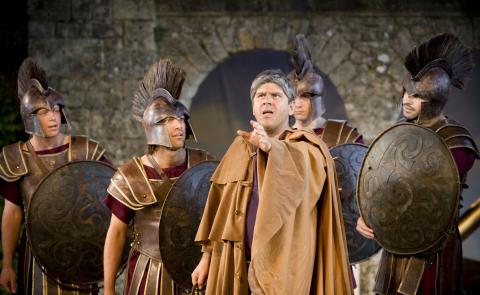|
<<< << -- 5 -- Roderic Dunnett SIMPLY WONDERFUL -- >> >>>

Togging up tenor Iain Paton -- a highly successful Early Music performer in his own right -- as Alexander seemed, as the pictures reveal, a wee bit like inviting Friar Tuck to play Robin Hood. Paton, like his cast of tree-chopping Macedonian soldiers with a regal 'A' emblazoned on their accoutrements, managed the slapstick rather well. Alexander the Funny, Alexander the Chubby, Alexander the Cheeky, the Ironic, but certainly not Alexander the Great. This Great King of Greece -- if not Egypt and Asia too -- seemed wholly in place with the topiaried cypressus trees which (very comically) stood up in the middle of Garsington's Italian garden and paraded lumpenly onstage, or the hilarious moment when about forty-four soldiers piled out of a tent not much bigger than a table. Lest we take it all too seriously, or even seriously at all, there were plenty of contrived belly-laughs. Luckily the final scene -- notably Alexander's last exchanges with Agenore, not a send-up at all -- yielded a hint of the po-faced intensity the production deliberately skirted.

Iain Paton as Alessandro. Photo © 2007 Johan Persson
|
There was lots of gold: gold leaves on the tree, twee gold Macedonian tent, the whopping gold arrow, gold arrow tips on a black brazier, and at the end of the opera, fresh golden shoots and a golden fountain that burst forth in the gardens beyond. Most were devised for spoof effect: in an opera whose main focus is on the nobility of kingship, everything seemed to suggest Annilese Miskimmon, who went straight on to direct Offenbach's Bluebeard for the Buxton Festival (a perfect vehicle for her talents), had gone for the send-up version. Some might fairly maintain that this approach, being the only sane one to take with a libretto such as this, succeeded.
All well and good, if one takes the view that this Enlightenment idea of 'noblesse oblige' is just too silly and patronising to treat seriously. Yet to treat it comically was to be almost as patronising in its own way. It completely hoisted Burggraafs's Aminta -- an actor/actress with huge potential and arguably charisma too, but badly in need of clever, thoughtful and precise, focused direction. Here, the personality of this noble savage seemed almost totally unmapped. Yet if kingly potential does not shine patently forth from this boyish shepherd, reinforcing his unswerving, colt-like loyalty to first love ('such fidelity deserves a crown'), the whole point is marred.
Continue >>
Copyright © 15 July 2007
Roderic Dunnett, Coventry UK

|

